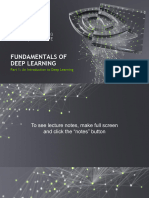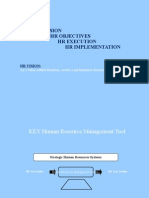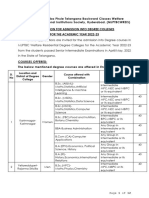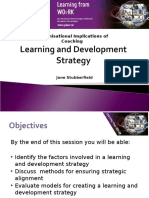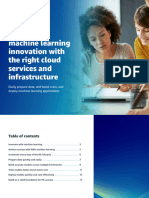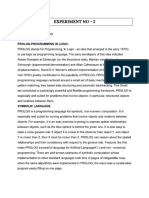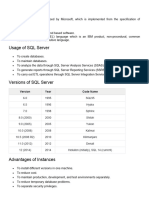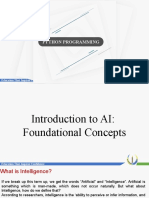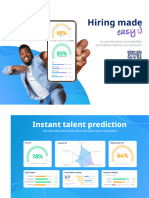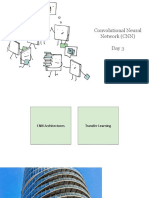0 ratings0% found this document useful (0 votes)
94 viewsArtificial Intelligence As A Service
Artificial Intelligence As A Service
Uploaded by
Tanusha handeArtificial intelligence as a service (AIaaS) is defined as a service that outsources AI to enable individuals and companies to explore and scale AI techniques at a minimal cost. AIaaS allows individuals and companies to experiment with AI for various purposes without large initial investment and with lower risk. AI cloud offerings, including Amazon Machine Learning, Microsoft Cognitive Services and Google Cloud Machine Learning, can help organizations learn what might be possible with their data.
Copyright:
© All Rights Reserved
Available Formats
Download as DOCX, PDF, TXT or read online from Scribd
Artificial Intelligence As A Service
Artificial Intelligence As A Service
Uploaded by
Tanusha hande0 ratings0% found this document useful (0 votes)
94 views3 pagesArtificial intelligence as a service (AIaaS) is defined as a service that outsources AI to enable individuals and companies to explore and scale AI techniques at a minimal cost. AIaaS allows individuals and companies to experiment with AI for various purposes without large initial investment and with lower risk. AI cloud offerings, including Amazon Machine Learning, Microsoft Cognitive Services and Google Cloud Machine Learning, can help organizations learn what might be possible with their data.
Original Title
Artificial Intelligence As a Service
Copyright
© © All Rights Reserved
Available Formats
DOCX, PDF, TXT or read online from Scribd
Share this document
Did you find this document useful?
Is this content inappropriate?
Artificial intelligence as a service (AIaaS) is defined as a service that outsources AI to enable individuals and companies to explore and scale AI techniques at a minimal cost. AIaaS allows individuals and companies to experiment with AI for various purposes without large initial investment and with lower risk. AI cloud offerings, including Amazon Machine Learning, Microsoft Cognitive Services and Google Cloud Machine Learning, can help organizations learn what might be possible with their data.
Copyright:
© All Rights Reserved
Available Formats
Download as DOCX, PDF, TXT or read online from Scribd
Download as docx, pdf, or txt
0 ratings0% found this document useful (0 votes)
94 views3 pagesArtificial Intelligence As A Service
Artificial Intelligence As A Service
Uploaded by
Tanusha handeArtificial intelligence as a service (AIaaS) is defined as a service that outsources AI to enable individuals and companies to explore and scale AI techniques at a minimal cost. AIaaS allows individuals and companies to experiment with AI for various purposes without large initial investment and with lower risk. AI cloud offerings, including Amazon Machine Learning, Microsoft Cognitive Services and Google Cloud Machine Learning, can help organizations learn what might be possible with their data.
Copyright:
© All Rights Reserved
Available Formats
Download as DOCX, PDF, TXT or read online from Scribd
Download as docx, pdf, or txt
You are on page 1of 3
Artificial Intelligence As a Service (AIaaS)
Artificial intelligence as a service (AIaaS) is defined as a service that outsources AI
to enable individuals and companies to explore and scale AI techniques at a minimal
cost. Artificial intelligence benefits businesses in numerous ways, right from
improving customer experiences to automating redundant tasks. However,
developing in-house AI-based solutions is a complex process and requires huge
capital investment. That’s why businesses are openly embracing AIaaS, where third-
party providers offer ready-to-use AI services.
Artificial Intelligence as a Service (AIaaS) is the third-party offering of artificial
intelligence (AI) outsourcing. AIaaS allows
individuals and companies to experiment
with AI for various purposes without large
initial investment and with lower risk.
Cloud AI service providers can offer the
specialized hardware needed for some AI
tasks, like GPU-based processing for
intensive workloads. Purchasing the
required hardware and software to start
an on-premises cloud AI is costly. Add in
staffing and maintenance costs, as well as needed hardware changes for different
tasks, and AIaaS becomes cost prohibitive to many organizations.
AI cloud offerings, including Amazon Machine Learning, Microsoft Cognitive Services
and Google Cloud Machine Learning, can help organizations learn what might be
possible with their data.
1. AI infrastructure: AI data: When you apply large volumes of data to
statistical algorithms, it is regarded as a functional ML model. These models
are built to learn from patterns in the existing data. The sheer volume of data
decides the accuracy percentage of the predictions. For example, numerous
medical reports train deep learning networks, which further evolve and detect
medical emergencies, cancer, or tumors.
AI compute: AI compute services include VMs, serverless computing, and
batch processing. These computing methods are used to enhance parallel
processing and automate ML tasks. For example, Apache Spark is a real-time
data processing engine that has a scalable ML library.
2. AI services: Cognitive computing: Cognitive computing APIs include
speech, text analytics, voice translation, and search. These services are
accessed as REST endpoints by developers and integrated with applications
with a single API call.
Custom computing: Although APIs serve the purpose in generic
cases, cloud providers are shifting toward custom computing, enabling users
to experience cognitive computing using custom datasets.
Conversational AI: Today, the world is becoming increasingly familiar with
virtual assistants as end-users continue to accept AI readily.
3. AI tools : Wizards: Amateur data scientists are served with wizards to
reduce the complexity of training ML models
Integrated development environment (IDE): Experienced cloud vendors are
making substantial investments in IDEs and notebooks (browser-based) that
help in easy ML model testing and management.
Data preparation tools: The performance of ML models heavily depends on
the quality of data. To ensure the top-notch efficiency of ML models, public
cloud vendors are providing data preparation tools that can perform
the extract, transform, load (ETL) job
Frameworks: Cloud providers offer ready-to-go VM templates with
frameworks such as TensorFlow, Apache MXNet, and Torch, as setting up,
installing, and configuring the required data-science environment has become
complicated.
4.
You might also like
- Defense in Depth: An Action Plan To Increase The Safety and Security of Advanced AIDocument284 pagesDefense in Depth: An Action Plan To Increase The Safety and Security of Advanced AIIan KrietzbergNo ratings yet
- Learning Robotics Using PythonDocument329 pagesLearning Robotics Using PythonJULIÁN ANDRES LÓPEZ RODRÍGUEZ100% (3)
- Cloud Based Bus Ticket Generation System Ijariie11508Document3 pagesCloud Based Bus Ticket Generation System Ijariie11508Tanusha handeNo ratings yet
- Fundamentals of Deep LearningDocument195 pagesFundamentals of Deep LearningdaniyadevaccNo ratings yet
- Online Registration of Establishment With DSC: User ManualDocument39 pagesOnline Registration of Establishment With DSC: User ManualroseNo ratings yet
- Chemical IndustriesDocument8 pagesChemical IndustriesapsraiduNo ratings yet
- Ashish John HR Analytics AssingementDocument32 pagesAshish John HR Analytics AssingementAshish JohnNo ratings yet
- PF FormDocument20 pagesPF Formkiranair4No ratings yet
- Pharmacy College ListDocument6 pagesPharmacy College ListHNo ratings yet
- Income Under The Head "Salaries": Shubhangi Gupta Roll No. 11 Financial Management Bhartiya Vidya BhavanDocument44 pagesIncome Under The Head "Salaries": Shubhangi Gupta Roll No. 11 Financial Management Bhartiya Vidya Bhavanhny0910No ratings yet
- CCNA Cisco Routing Protocols and Concepts Final Exam-PracticeDocument22 pagesCCNA Cisco Routing Protocols and Concepts Final Exam-Practicesabriel69100% (1)
- HR Vision HR Objectives HR Execution HR ImplementationDocument9 pagesHR Vision HR Objectives HR Execution HR ImplementationMohammed NasserNo ratings yet
- TO ManualDocument69 pagesTO Manualuscbb20125No ratings yet
- Income Tax DepartmentDocument19 pagesIncome Tax DepartmentSharathNo ratings yet
- Eram Shaikh - Onboarding KIT Template 23 May 2022Document97 pagesEram Shaikh - Onboarding KIT Template 23 May 2022Tariq ShaikhNo ratings yet
- PF Pension Settlement Form-TCSDocument4 pagesPF Pension Settlement Form-TCSSridhara Krishna BodavulaNo ratings yet
- ESIC From 5A Return of ContributionDocument4 pagesESIC From 5A Return of ContributionCA.Nahush SahasrabuddheNo ratings yet
- TS Residential Degree CollegesDocument12 pagesTS Residential Degree Collegessris802No ratings yet
- TDS Rates and ReturnsDocument3 pagesTDS Rates and ReturnsKashishKumarNo ratings yet
- RegistrationDocument15 pagesRegistrationpratikdhond100% (3)
- Monthly New Joining Tracker ExcelDocument9 pagesMonthly New Joining Tracker ExcelSatyamev Jayate Raipur Foundation, Social Cause NGONo ratings yet
- PFWITHDRAWALFORM-19Document2 pagesPFWITHDRAWALFORM-19rafiuddin623No ratings yet
- Attendance Register FormatDocument1 pageAttendance Register Formatvishal_mtoNo ratings yet
- TDS Notification, Circular and Form16, Form 16A, EtcDocument27 pagesTDS Notification, Circular and Form16, Form 16A, EtcnarendragkNo ratings yet
- LTO - Talent AcquisitionDocument35 pagesLTO - Talent AcquisitionHO JING YI MBS221190No ratings yet
- Kar Shops Commercial Forms FormatDocument16 pagesKar Shops Commercial Forms FormatbelvaisudheerNo ratings yet
- Osmania UniversityDocument7 pagesOsmania Universitymahesh.revisitNo ratings yet
- Contract Labour FORM XDocument1 pageContract Labour FORM Xhdpanchal86No ratings yet
- Group A & B College List PDFDocument19 pagesGroup A & B College List PDFSarah ArpithaNo ratings yet
- Statutory Reports As Per Karnataka Shops Establishment Act-1Document12 pagesStatutory Reports As Per Karnataka Shops Establishment Act-1Rafunsel PresentationNo ratings yet
- Esic ChallanDocument7 pagesEsic Challanrgsr2008No ratings yet
- List of Misconduct (Maju Intan)Document6 pagesList of Misconduct (Maju Intan)NasFiqqNo ratings yet
- Industrial Leave PolicyDocument5 pagesIndustrial Leave PolicyCheema HnpsNo ratings yet
- ESI Form 5Document4 pagesESI Form 5savita17julyNo ratings yet
- Students ListDocument36 pagesStudents Listbharath.gharpeNo ratings yet
- Sample Salary Deduction FormDocument2 pagesSample Salary Deduction FormIch NadeeyaNo ratings yet
- Salary AdministrationDocument17 pagesSalary AdministrationMae Ann GonzalesNo ratings yet
- Family Pension SchemeDocument15 pagesFamily Pension SchemeJitu Choudhary100% (1)
- Vendor Mech AllDocument152 pagesVendor Mech Allamiit_ag0% (1)
- Hse Induction ListDocument24 pagesHse Induction ListArshad KhanNo ratings yet
- Telangana 12th BPC 2017 18 Batch SamplesDocument9 pagesTelangana 12th BPC 2017 18 Batch SamplesShiva PvNo ratings yet
- Employees' State Insurance Corporation E-Pehchan Card: Insured Person: Insurance No.: Date of RegistrationDocument3 pagesEmployees' State Insurance Corporation E-Pehchan Card: Insured Person: Insurance No.: Date of RegistrationGoutam HotaNo ratings yet
- Esic Online ChallanDocument26 pagesEsic Online ChallanahtradaNo ratings yet
- None - FORM 14 - REGISTER OF LEAVE WITH WAGES FOR THE YEARDocument1 pageNone - FORM 14 - REGISTER OF LEAVE WITH WAGES FOR THE YEARSarvesh Mishra100% (1)
- Statutory Due Date For F y 15 16Document1 pageStatutory Due Date For F y 15 16rajdeeppawarNo ratings yet
- RangareddyDocument24 pagesRangareddykishan.aditya2021No ratings yet
- Business Process Outsourcing (BPO) Company Registration in IndiaDocument15 pagesBusiness Process Outsourcing (BPO) Company Registration in IndiavinothNo ratings yet
- Organisational Implications of Coaching: Jane StubberfieldDocument13 pagesOrganisational Implications of Coaching: Jane Stubberfieldarjun.ec633No ratings yet
- Pension Rules:: FormulaDocument4 pagesPension Rules:: FormulaMunnangi NagendrareddyNo ratings yet
- What Is A Flexible Benefit Plan in A Salary Breakup? - QuoraDocument8 pagesWhat Is A Flexible Benefit Plan in A Salary Breakup? - QuoraSiNo ratings yet
- Manual 2Document252 pagesManual 2ballubalrajNo ratings yet
- Selection List-Mpc (1:1) : TREI Society, TSRJC-CET - Phase-II Admission DT: 09.09.2021 Adilabad Boys MPC & BPCDocument34 pagesSelection List-Mpc (1:1) : TREI Society, TSRJC-CET - Phase-II Admission DT: 09.09.2021 Adilabad Boys MPC & BPCSNo ratings yet
- Cost Per Hire CalculationsDocument2 pagesCost Per Hire CalculationsAteet RawatkarNo ratings yet
- Form XXVDocument5 pagesForm XXVK Srinivasa RaoNo ratings yet
- Ttwrcoecet 2024Document9 pagesTtwrcoecet 2024eDiscNo ratings yet
- All Forms Under Factories Act 1948Document2 pagesAll Forms Under Factories Act 1948jagshishNo ratings yet
- ESIC Paid Challan May 24Document1 pageESIC Paid Challan May 24ascoultrapowerNo ratings yet
- Form-6 Register of EmployeesDocument3 pagesForm-6 Register of EmployeessandilyavikasNo ratings yet
- Ai in Cloud PDF 1Document14 pagesAi in Cloud PDF 1SatishNo ratings yet
- Accelerate Machine Learning Innovation With The Right Cloud Services and InfrastructureDocument17 pagesAccelerate Machine Learning Innovation With The Right Cloud Services and Infrastructureroxodo8599No ratings yet
- M Icrosoft AzureDocument4 pagesM Icrosoft AzureMelese AschalewNo ratings yet
- Mis AssignmentDocument6 pagesMis AssignmentShahnawaz KhanNo ratings yet
- AimlDocument16 pagesAimlmanideep6749No ratings yet
- AIDocument24 pagesAITanusha handeNo ratings yet
- CN Notes (UT 2)Document22 pagesCN Notes (UT 2)Tanusha handeNo ratings yet
- DocScanner 12 Jan 2024 12-36Document43 pagesDocScanner 12 Jan 2024 12-36Tanusha handeNo ratings yet
- HTML5 NotesDocument39 pagesHTML5 NotesTanusha handeNo ratings yet
- Css NotesDocument22 pagesCss NotesTanusha handeNo ratings yet
- Experiment 2 & 3Document4 pagesExperiment 2 & 3Tanusha handeNo ratings yet
- Priority QueueDocument23 pagesPriority QueueTanusha handeNo ratings yet
- SQL Server Tutorial NEWDocument204 pagesSQL Server Tutorial NEWTanusha handeNo ratings yet
- MCQ QuestionsDocument8 pagesMCQ QuestionsTanusha handeNo ratings yet
- The Role of Artificial Intelligence in Interactive Flat PanelsDocument9 pagesThe Role of Artificial Intelligence in Interactive Flat Panelsmdhamzah2203No ratings yet
- Application of Big Data Analytics in The Electrical Sector A Real Case StudyDocument6 pagesApplication of Big Data Analytics in The Electrical Sector A Real Case Studybhasker sharmaNo ratings yet
- 5th & 6th Sem BCA SyllabusDocument27 pages5th & 6th Sem BCA SyllabuskarthikNo ratings yet
- AI IntroductionDocument16 pagesAI IntroductionHitesh GoyalNo ratings yet
- Accelerated Leadership Development How To Turn Your Top Talent Into LeadersDocument312 pagesAccelerated Leadership Development How To Turn Your Top Talent Into LeadersRoma DudarevNo ratings yet
- Project 101127924Document2 pagesProject 101127924Rakib hasanNo ratings yet
- OIE 751 ROBOTICS Unit 3 Class 5 (19-9-2020)Document14 pagesOIE 751 ROBOTICS Unit 3 Class 5 (19-9-2020)MICHEL RAJ100% (1)
- 23-10-Pulsifi-Hiring BrochureDocument8 pages23-10-Pulsifi-Hiring BrochuremailjestNo ratings yet
- History of Artificial Intelligence BeforDocument6 pagesHistory of Artificial Intelligence Beforwas symNo ratings yet
- AI EducationDocument7 pagesAI EducationDr Hafizah HajimiaNo ratings yet
- The Role of Artificial Intelligence in HealthcareDocument2 pagesThe Role of Artificial Intelligence in HealthcareNishal S ReddyNo ratings yet
- HolonIQ 2021 Global Learning Landscape HandbookDocument70 pagesHolonIQ 2021 Global Learning Landscape HandbookQuang TranNo ratings yet
- Research Market in 2024Document2 pagesResearch Market in 2024minty yoNo ratings yet
- 300 Ai Tools GuideDocument304 pages300 Ai Tools Guidescoremaster ICSE JAVA100% (2)
- 205 Wxes1110 L 38200916439Document21 pages205 Wxes1110 L 38200916439murnianashazwenNo ratings yet
- CNN Architectures - Transfer LearningDocument64 pagesCNN Architectures - Transfer LearningBaraniNo ratings yet
- Cognitive BankingDocument15 pagesCognitive Bankingrajitha revannaNo ratings yet
- Nikhil R: M.Sc. Data Science (Integrated)Document1 pageNikhil R: M.Sc. Data Science (Integrated)Sabari NathanNo ratings yet
- Ex Lecture1Document2 pagesEx Lecture1AlNo ratings yet
- Assignment No. 1Document3 pagesAssignment No. 1Pam ElaNo ratings yet
- Nudging Towards Responsible Recommendations A Graph-Based Approach To Mitigate Belief Filter BubblesDocument15 pagesNudging Towards Responsible Recommendations A Graph-Based Approach To Mitigate Belief Filter Bubbles2467953405lzyNo ratings yet
- An Overview of Overfitting and Its SolutionsDocument7 pagesAn Overview of Overfitting and Its SolutionsImane HaidarNo ratings yet
- Deep Learning With TensorflowDocument70 pagesDeep Learning With TensorflowaminaNo ratings yet
- HLTH3016 S&C 2023Document22 pagesHLTH3016 S&C 2023AlexNo ratings yet
- 8d20d Technology Governance Forging A New Era of Public PolicyDocument12 pages8d20d Technology Governance Forging A New Era of Public Policyvasanth kumar mNo ratings yet
- TOC Assignment No-1Document5 pagesTOC Assignment No-1Dhruv KuchhalNo ratings yet
- Computer - Final Year Sem. Vii and ViiiDocument73 pagesComputer - Final Year Sem. Vii and ViiiJayesh RaneNo ratings yet
- Mca 27 00002Document21 pagesMca 27 00002Rittik Kumar NaskarNo ratings yet



